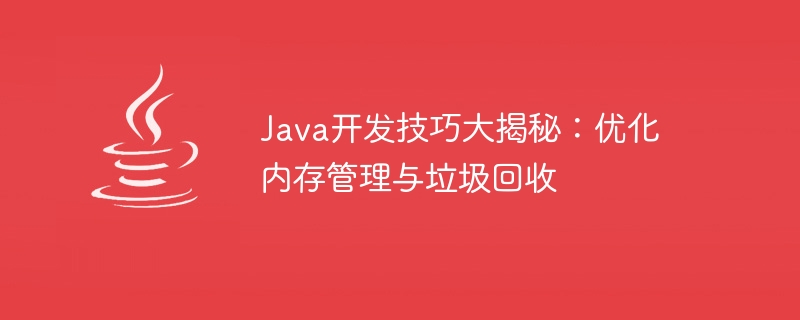

As a high-level programming language, Java has been widely used to develop various types of software and applications. In Java development, memory management and garbage collection are key technologies, which play an important role in the performance and stability of the program. This article will reveal some important Java development tips so that you can better optimize memory management and garbage collection.
First of all, it is important to understand Java's memory model. Java's memory is divided into heap memory and stack memory. Among them, heap memory is used to store dynamically allocated data such as object instances and arrays, while stack memory is used to store local variables and method parameters of methods. For memory management and garbage collection, heap memory is the main focus. Therefore, reasonable configuration of heap memory size is crucial to optimizing the performance of Java programs.
Secondly, rational use of object pools is a good way to optimize memory management. Object pool is a technology that pre-creates and caches a certain number of objects so that the objects are not destroyed after use, but put back into the object pool for subsequent use. In this way, frequent creation and destruction of objects can be avoided, thereby reducing the pressure of garbage collection and improving program performance and stability. In Java, you can use open source object pool frameworks such as Apache Commons Pool to implement the object pool function.
In addition, paying attention to timely release of no longer used resources is also one of the key skills for optimizing memory management. In Java, when an object is no longer referenced, it will be treated as garbage, and the garbage collector will be responsible for automatically reclaiming the memory space of these garbage objects. However, sometimes the garbage collector cannot immediately detect that an object has become garbage. To avoid this, you can manually release resources that are no longer in use. For example, close resources such as files in a timely manner after the IO operation is completed, or set an object to null when it is no longer needed, so as to promptly release the memory space it occupies.
In addition, understanding the garbage collection mechanism and tuning parameters is also an important part of optimizing memory management. In Java, the garbage collector is responsible for automatically recycling objects that are no longer used and releasing the memory space they occupy, thereby avoiding memory leaks. Different garbage collectors have different algorithms and strategies, such as mark-sweep algorithm, copy algorithm, mark-complement algorithm, etc. According to the specific application scenarios and system requirements, you can choose the appropriate garbage collector and tuning parameters. You can configure the heap memory size by setting the -Xmx and -Xms parameters, adjust the ratio of the new generation to the old generation by adjusting the -XX:NewRatio parameter, and enable concurrent mark clearing garbage collection through the -XX:UseConcMarkSweepGC parameter.
Finally, regular performance testing and optimization are necessary steps to optimize memory management. Through performance testing, the performance and stability of Java programs can be evaluated, and bottlenecks in the program and room for performance optimization can be found. Through code optimization, memory leak troubleshooting and repair, and reasonable configuration of garbage collector parameters, memory management and garbage collection can be further optimized, and the performance and stability of Java programs can be improved.
In summary, memory management and garbage collection in Java development skills are very important. By properly configuring the heap memory size, using object pools, releasing resources in a timely manner, understanding the garbage collection mechanism and tuning parameters, and performing regular performance testing and optimization, you can effectively optimize the memory management and garbage collection of Java programs and improve the performance of the program. and stability. I hope the secrets revealed in this article can be helpful to everyone in Java development.
The above is the detailed content of Java development skills revealed: Optimizing memory management and garbage collection. For more information, please follow other related articles on the PHP Chinese website!
